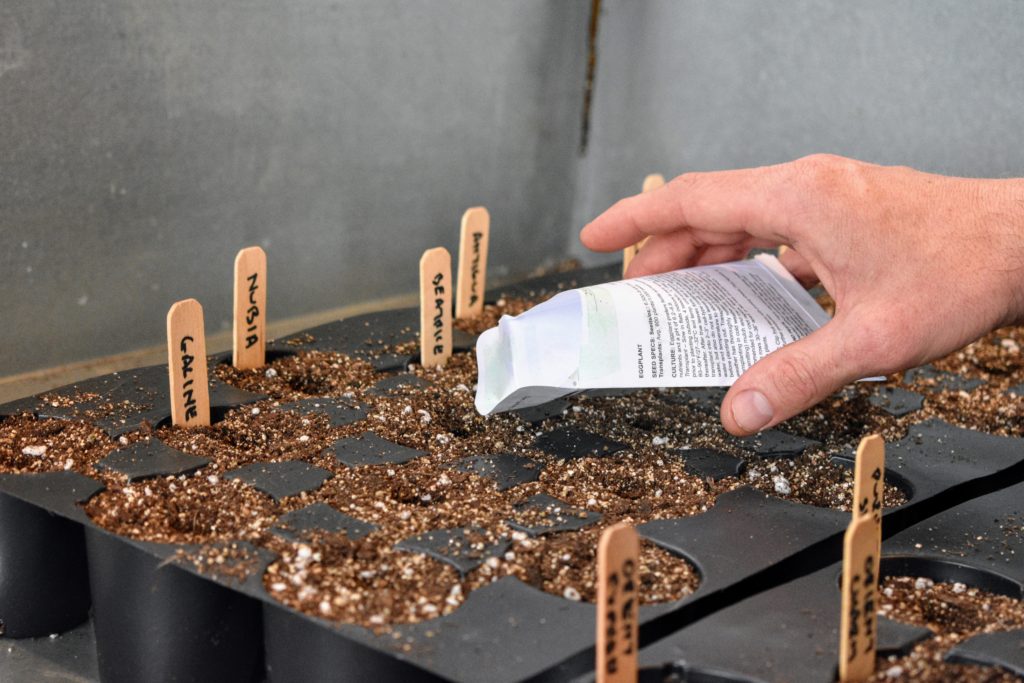

If you want a healthy and prolific eggplant, your best bet is to give it its own space where it can soak up the sun. Put a layer of organic mulch around their base to help keep moisture in the soil. You’ll find lots of ideas that work for eggplants too.Īs far as companion planting goes, eggplant does well when planted with other nightshades, like peppers or tomatoes, but again, make sure they won’t be in the shade of taller plants. Take a look at our article sharing 38 ideas for supporting tomato plants.
#EGGPLANT SEED STARTING ZIP#
I like to use these little reusable zip ties when staking my plants because they are gentle on the stalks, and I can reuse them year after year. Plant them where they won’t be shaded out by other plants and give them at least 18” of space away from other plants. (This works great for tomatoes and peppers too!) Sun and space requirementsĮggplants need quite a bit of room to grow. You can feed them the Epsom salt once a month. An easy and all-natural way to do this is to mix a tablespoon of Epsom salt in a gallon of water and water your plant with this solution. The Old Farmer’s Almanac Tomato & Vegetable Plant Fertilizer fits the bill.Įggplants flourish if they are fed magnesium. However, once they start to produce flowers, you need to cut back on the nitrogen and switch to a vegetable-specific fertilizer, otherwise you will end up with large, bushy plants, but no fruit. Usually, an all-purpose fertilizer is sufficient. When your plants are small, be sure to feed them a nitrogen-rich fertilizer. Soil and feedingĮggplants do best in neutral to slightly acidic soil, between 5.5 – 7 pH. Slowly lengthen the time they spend outdoors and be careful not to let your seedlings dry out. You can do this by moving them to a cooler area in your home, as well as by putting them outdoors for a few hours at a time during the day. However, later planting can help ward off pests, so it’s something to consider.īefore you can transplant your eggplant, you’ll need to harden them off. If you want to get a jump on the season, put a layer of black landscape cloth on your freshly tilled garden and tuck the edges down into the dirt. Check the frost dates for your area and plan accordingly. Stake these little guys early! When to transplantĮggplant seedlings shouldn’t be planted outdoors until all danger of frost is past, and the ground has warmed up significantly. You can always use a grow light to help them along if you don’t have much natural light in your home.Ĭover the pots with a dome to keep them warm and moist until the seedlings are around 2” tall. They will need at least 6-8 hours of light a day. Water and keep them in a warm and bright place in your home.

Sow one seed per seedling pot about ¼” deep. To start eggplant seedlings, you’ll want to plant the seeds between 8 to 10 weeks before you plan to transplant them outside.

There are quite a few beautiful hybrids and heirloom varieties available if you’re willing to grow them from seed, these are great for anyone looking to try something new and different.īaker Creek Heirloom Seeds offer a number of eggplant varieties to try growing yourself. However, as their popularity grows, you can often find Japanese/Asian or even white eggplants in nurseries now. I would recommend planting from seed if you want a variety beyond the usual Black Beauty, which are the most commonly found eggplants for nursery starts. There are some excellent fast-maturing varieties that will give you a lovely yield of fruit as well, like the slender and delicious Japanese eggplant. However, that doesn’t mean places with shorter growing seasons have to do without. These bushy plants require considerable space in the garden, but some varieties do well in containers too.Įggplants are heat-loving and do best in areas with long, hot summers. I hope you’ll make room for these wonderful In other parts of the world, eggplants are known as aubergine or brinjal.Īll things considered, they are one of my personal favorites They are a fruit, even though we generally think of them as a vegetable. Whether you grow them in your garden or a container,Įggplants can be an excellent addition to your homegrown harvest each year.Įggplants are native to Asia and a member of the nightshade family, like tomatoes and peppers. Knowing a bit more about the needs of these lovely plants makes growing them successfully much easier. They have a reputation for being a rather fussy vegetable. This misunderstood vegetable has very few tepid fans.Įven those of us that adore the creamy taste of perfectly cooked eggplant rarely think to plant them in the garden. Eggplant – you either love it or hate it.


 0 kommentar(er)
0 kommentar(er)
